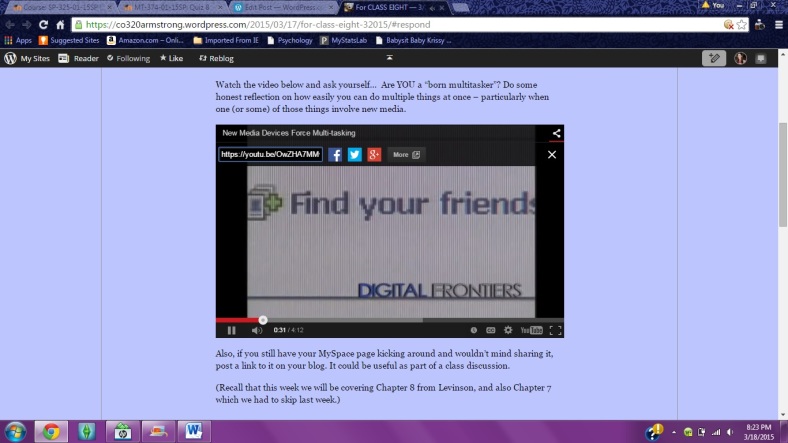I. When does new become old?
Reading: New, New Media, Chapter 2 (Facebook), http://www.nytimes.com/2011/12/14/technology/shunning-facebook-and-living-to-tell-about-it.html?_r=1&smid=tw-nytimes&seid=auto
In the New York Times article, Tyson Balcomb made an eerily accurate case about the ‘creepy factor’ that Facebook can contain. Balcomb pointed out, before ‘quitting Facebook,’ “At that point I thought, maybe this is a little unhealthy,” as he described how he was a little too easily able to discover a decent amount of information about a woman, a stranger, he came into contact with on an elevator simply by looking at her public Facebook profile.
I must admit, that I have been guilty of this awkward, yet very real, experience myself, and I have known many people (maybe everyone I know who is on Facebook), who have experienced this as well. You want to find out more about a person you have just met, or you find a guy (or girl) who is super attractive but you aren’t sure his (or her) name, so you go to Facebook to seek out that info. The information is relatively easy to access, and users put their information out there for it to be accessed. Weird? Maybe.
Which leads into the next subtopic in the article: is Facebook making us antisocial, despite its purpose of linking people together? Perhaps. One woman in the article, Ashleigh Elser, stated: “I wasn’t calling my friends anymore. I was just seeing their pictures and updates and felt like that was really connecting to them.”
Partially, I think that Facebook has been supplemental to keeping in touch with old friends, classmates, teachers, long-distance family members, etc. However, when Facebook becomes the only way to keep in touch with these people, it really doesn’t make a person very social at all. Even though there is communication in the sense of giving and receiving information, there is a lack of face time between people by relying on online social media for communication. Relationships simply don’t work this way. Does a “like” or comment on a Facebook post now equal a phone call?
Strangely enough, having a Facebook or some form of online profile has become a near-necessary norm in our generation. If someone decides to take themselves away from their blogs and profiles, their motives are often questioned or they are individually seen as strange. Like mentioned in the article, a question that comes to mind might be, “what are they hiding?” Maybe nothing at all, but unfortunately this is the judgment that has come into play. There have honestly been times when I wanted to disable my account; I see controversial statuses just asking for drama, I get another Candy Crush Saga request (despite not even playing the game), or I see friends posting photos of their amazing tropical vacation as I sit at my work desk and I get a little jealous, or maybe it is going back to the borderline-Facebook-stalking moments, and I wonder if it was worth it; maybe I find myself only keeping in touch with some of my old friends from high school through Facebook messaging and wonder about the last time we talked in person or over the phone, (a topic that Chapter 2 of the text takes a look at as well). Ironically, meeting someone in person after first meeting them online is still a concept that, if not frowned upon, is still not quite part of the norm as much as meeting someone in person first. Yet, despite the cons of having a Facebook, I continue to find myself logging on each and every time I go on a computer, or pressing the navy blue and white app icon on my devices to respond to my notifications and see what my friends are up to. How has this become a lifestyle? I envy Mark Zuckerberg more than those friends who are sitting on a beach during their spring break right now.
II. Realities we forget are real.
Reading: New, New Media, Chapter 7 (FourSquare and Hardware)
Chapter 7 discusses the use of Foursquare, a type of social media I have never used before. However, going back to Facebook, I have on occasion “checked-in” to places I have been, for example, if I really like a restaurant and wanted to tell my friends about it and its food. I think Foursquare and Facebook share this feature. I don’t typically like to have my ‘location’ on on my devices and social media platforms, however. I knowingly put a lot of information out on my Facebook and somewhat on my Twitter, but there is something about pinpointing your location at every given moment to people you don’t know well or barely speak to that makes me feel like my privacy is being violated.
Think about your Facebook friends; who are they? Come up with some rough percentages about the people who make up your Facebook “friend” list. What percentage are your family? your close friends? acquaintances? people you’ve never met in person? Come up with whatever categories you want – and blog about what you find.
Also, consider Levinson’s pg. 25 comment that ” . . .we most love what we first experience.” How, if at all, do you think that sentiment applies to your interactions with Facebook?
Of my 487 Facebook “friends,” I have family, co-workers (including my boss), classmates and acquaintances from high school and college, and of course, my actual real-life friends. I do not have anyone that I have not met in person, but I have a few people who I have barely talked to in person. Rough percentages might be 80% classmates and school acquaintances, 10% actual friends, less than 5% co-workers, and about 5% family members. That is a rough estimate and the labels for each are very broad, there’s the “sorta” friends and best friends and more categories among those, but then I’d have to pick apart nearly every person on my Facebook, because they’re all different.
Considering Levinson’s comment “We most love what we first experience,” is a sentiment, I think that considers nostalgia and originality. That could be applied to Facebook in the aspect that when people first started using Facebook, this might have been their first time on an online social media platform. It was for me, I never had a MySpace or anything, and I don’t think I’ll be seeking another social media platform at any point, being used to and enjoying the convenience and originality of Facebook.







